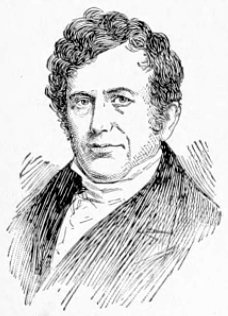Samuel Fessenden facts for kids
Quick facts for kids
Samuel Fessenden
|
|
|---|---|
 |
|
| Member of the Massachusetts State Senate | |
| In office 1818–1819 |
|
| Member of the Massachusetts House of Representatives | |
| In office 1815–1816 |
|
| Personal details | |
| Born | July 16, 1784 Fryeburg, Massachusetts |
| Died | March 13, 1869 (aged 84) Portland, Maine |
| Political party | |
| Spouse |
Deborah Chandler
(m. 1813) |
| Education | Dartmouth College |
| Occupation | Lawyer, politician |
| Signature | |
Samuel Fessenden (born July 16, 1784 – died March 13, 1869) was an American lawyer, a strong supporter of ending slavery (an abolitionist), and a politician. He served in both parts of the Massachusetts state legislature before Maine became a separate state. He was also chosen as a major general in the state militia. People thought he was a very important leader among lawyers.
Samuel Fessenden's Early Life
Samuel Fessenden was born on July 16, 1784. This was in a place now called Fryeburg, Maine. Back then, Maine was still part of Massachusetts until 1820. His father was Reverend William Fessenden. He graduated from Harvard College in 1768. Samuel's father was the first minister in Fryeburg. He was also active in politics. He was elected several times to the Massachusetts state legislature. His father also worked as a judge for wills and estates.
Fessenden went to school at the Fryeburg Academy in his hometown. He graduated from Dartmouth College in 1806. After college, he studied law. He learned from Judge Dana in Fryeburg and also from Daniel Webster. He became a lawyer in 1809.
Samuel Fessenden's Career in Law and Politics
Fessenden started his law practice in New Gloucester, Maine. This town was also part of Massachusetts at the time. He quickly became involved in local politics.
From 1815 to 1816, Fessenden was elected. He served a term as a representative. This was in the Massachusetts House of Representatives. Then, he was elected to the Massachusetts State Senate. He served there from 1818 to 1819. Fessenden also joined the state militia. After leaving the senate, he was chosen as a major general. He led the 12th division of the Massachusetts militia. Later, this became the Maine militia. Maine became a separate state in 1820. This happened as part of a big agreement called the Missouri Compromise.
In 1822, Fessenden moved his family to Portland, Maine. This city offered more chances for his career. Around 1828, he was offered the job of president of Dartmouth College. However, he turned it down.
Fessenden was a strong supporter of the Federalist Party. He was also one of the first members of the anti-slavery party in Maine. In 1847 and 1848, he ran for office. He was a candidate for the United States Congress and governor of Maine. He ran with the Liberty Party. He was also an early supporter of the new Republican Party in the United States.
For 40 years, Fessenden was seen as the top lawyer in his group. He was also very active in helping others. He gave money and time to good causes. He wrote two speeches and a book. The book was about the importance of juries in court. In 1846, he received an honorary law degree. This was from Bowdoin College.
Samuel Fessenden's Family
Three of Samuel Fessenden's sons also became involved in politics. William Pitt Fessenden became the United States Secretary of the Treasury. Two other sons, Samuel C. Fessenden and T. A. D. Fessenden, were elected as U.S. congressmen.
His son, William Pitt Fessenden, was born on October 16, 1806. His mother was Ruth Greene, who was not married to Samuel at the time. William Pitt was raised by his grandparents for seven years.
Samuel Fessenden married Deborah Chandler in 1813. They had several children together. The family tree below shows the children of William Pitt Fessenden. Two of Samuel's grandsons, through William, became generals in the Union Army. This was during the American Civil War. Their names were Francis Fessenden and James D. Fessenden. A third grandson, Samuel Fessenden (born January 6, 1841, in Portland, Maine – died September 1, 1862, in Centreville, Virginia), was badly hurt in the Second Battle of Bull Run. He died from his injuries. He had graduated from Bowdoin College in 1861. He started studying law, but soon joined the military. He became a second lieutenant in November 1861. He was promoted to first lieutenant in June 1862. In July 1862, he became an aide to General Zebulon B. Tower.
Samuel Fessenden died in Portland on March 13, 1869.
Samuel Fessenden's cousin, Thomas Green Fessenden, became a well-known writer and editor.
|
||||||||||||||||||||||||||||||||||||||||||||||||||||||||||||||||||||||||||||||||||||||||||||||||||||||||||||||||||||||||||||||||||||||||||||||||||||||||||||||||||||||||||||||||||||||||||||||||||||||||||||||||||||||||||||||||||||||||||||||||||||||||||||||||||||||||||||||||||||||||||||||||||||||||||||||||||||||||||||||||||||||||||||||||||||||||||||||
| Notes: | ||||||||||||||||||||||||||||||||||||||||||||||||||||||||||||||||||||||||||||||||||||||||||||||||||||||||||||||||||||||||||||||||||||||||||||||||||||||||||||||||||||||||||||||||||||||||||||||||||||||||||||||||||||||||||||||||||||||||||||||||||||||||||||||||||||||||||||||||||||||||||||||||||||||||||||||||||||||||||||||||||||||||||||||||||||||||||||||
 | DeHart Hubbard |
 | Wilma Rudolph |
 | Jesse Owens |
 | Jackie Joyner-Kersee |
 | Major Taylor |

